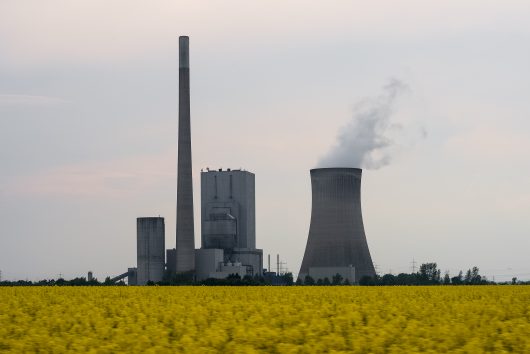France to Close all Coal Power Plants

This November at an annual U.N. climate change conference, President Francois Hollande announced that by 2023, France will no longer rely on coal for any of its energy. The country already derives over 75 percent of its electricity from alternative methods and President Hollande’s announcement indicates that France is to close all coal power plants.
Coal is relatively cheap and easy, making it a popular global energy source. Today, it makes up 40 percent of the world’s energy. Coal energy also produces 39 percent of global Carbon Dioxide (CO2) emissions.
Besides the heavy release of CO2 into the atmosphere, coal as an energy source is problematic in many ways. The mining and extraction process for obtaining coal can have severely detrimental effects on the environment. The process can cause the destruction of landscapes and habitats, deforestation and erosion, contamination of groundwater, air and dust pollution and the displacement of communities.
Coal mining releases methane into the atmosphere. In terms of contributing to climate change, methane is about 84 times as powerful as CO2. On top of this, coal mining is a very dangerous job and can often have harmful effects on workers’ health. Those who inhale coal dust can suffer from black lung disease, cardiopulmonary disease and hypertension.
France’s decision to close all coal power plants comes in the wake of The Paris Agreement, an agreement made between 195 countries in 2015 to set the world on track to avoid dangerous climate change.
The country has become a leader in low-carbon energy production by increasing its use of nuclear fission, which produces many more health and environmental risks than fossil fuels. The country creates so much nuclear energy that it is able to export much of it to neighboring nations, bringing in substantial domestic revenue. The decision to cut all coal energy production by 2023 will even beat the United Kingdom’s decision to do the same by two years.
The announcement shows that France is committed to the Paris Agreement and the radical changes that come along with it. The country passed a bill in September banning the use of plastic cups, silverware and dishware, which will be implemented in 2020. France is the first country in the world to pass such a law.
Countries such as Germany, Finland, the UK and Canada are following France’s example and committing to similar ecological goals. The U.S. gets about 33 percent of its energy from coal and President-elect Donald Trump has not yet outlined a plan for reducing coal production.
Overall, France’s commitment to close all coal power plants by 2030 is an example to follow. The goals of the Paris Agreement require concrete dedication to stopping climate change, and France and President Hollande recognize this.
– Peyton Jacobsen
Photo: Flickr
